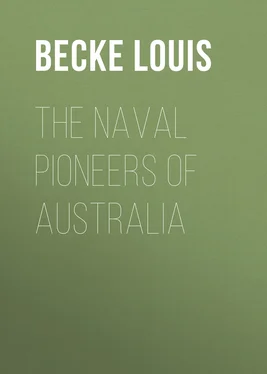Louis Becke - The Naval Pioneers of Australia
Здесь есть возможность читать онлайн «Louis Becke - The Naval Pioneers of Australia» — ознакомительный отрывок электронной книги совершенно бесплатно, а после прочтения отрывка купить полную версию. В некоторых случаях можно слушать аудио, скачать через торрент в формате fb2 и присутствует краткое содержание. Жанр: foreign_prose, literature_19, foreign_antique, на английском языке. Описание произведения, (предисловие) а так же отзывы посетителей доступны на портале библиотеки ЛибКат.
- Название:The Naval Pioneers of Australia
- Автор:
- Жанр:
- Год:неизвестен
- ISBN:нет данных
- Рейтинг книги:4 / 5. Голосов: 1
-
Избранное:Добавить в избранное
- Отзывы:
-
Ваша оценка:
- 80
- 1
- 2
- 3
- 4
- 5
The Naval Pioneers of Australia: краткое содержание, описание и аннотация
Предлагаем к чтению аннотацию, описание, краткое содержание или предисловие (зависит от того, что написал сам автор книги «The Naval Pioneers of Australia»). Если вы не нашли необходимую информацию о книге — напишите в комментариях, мы постараемся отыскать её.
The Naval Pioneers of Australia — читать онлайн ознакомительный отрывок
Ниже представлен текст книги, разбитый по страницам. Система сохранения места последней прочитанной страницы, позволяет с удобством читать онлайн бесплатно книгу «The Naval Pioneers of Australia», без необходимости каждый раз заново искать на чём Вы остановились. Поставьте закладку, и сможете в любой момент перейти на страницу, на которой закончили чтение.
Интервал:
Закладка:
Dampier left here on September 5th, intending again to land further north, but he abandoned the idea and directed his course for Timor. After he left Timor he called at New Guinea, discovered and named New Britain, now a German colonial possession, spent some weeks upon the New Guinea coast, and then returned to Timor, whence he began his voyage home. Off Ascension the Roebuck sprang a leak and foundered. Her company, who with difficulty saved their lives, landed upon Ascension, where they remained till they were rescued and brought to England in the Canterbury , East Indiaman.
During his stay on the coast of New Guinea Dampier, besides those discoveries already enumerated, made others, and the frequent appearance of his name on a modern chart of this coast still commemorates them.
Of Dampier's personality his writings give us little insight. As a good writer should, he keeps his private affairs out of his book, but how much we should have been interested in knowing something of the man's shore life! Mr. Clark Russell in his admirable sketch of Dampier, for example, takes it for granted that he never married, at any rate during his sea career. Dampier himself tells us he was married, and gives us a very good idea of when, but he so seldom, after once getting to work upon his narrative, gives us a glimpse of himself that it is easily understood how Mr. Russell came to miss that passage in the Voyage round the World in which the old sailor tells us how in 1687 he named an island the Duke of Grafton's Isle "as soon as we all landed on it, having married my wife out of the Duchess's family and leaving her at Arlington House at my going abroad."
He was, perhaps, not a great man, though a good sailor, who had certain qualities which placed him above his fellows. We imagine somehow that his expressed pious dislike for buccaneering was not altogether the cause of his abandoning the life, and that when he set out upon his career as an explorer the search for a land where gold could be easily got without fighting for it was his main motive. He himself tells us so, but we think that he might have been a greater man if his mind had been capable of a little higher aim than the easy getting of riches. The obscurity of his end is not remarkable when one considers how little was then thought of the value of his discoveries. It took many years for Cook's survey of New Holland to bring forth fruits.
In his third volume, written after his return from Ascension, he says:—
"It has always been the fate of those who have made new discoveries to be disesteemed and slightly spoken of by such as either have had no true relish and value for the things themselves that are discovered, or have had some prejudice against the persons by whom the discoveries were made. It would be vain, therefore, and unreasonable in me to expect to escape the censure of all, or to hope for better treatment than far worthier persons have met with before me. But this satisfaction I am sure of having, that the things themselves in the discovery of which I have been employed are most worthy of our diligent search and inquiry, being the various and wonderful works of God in different parts of the world; and, however unfit a person I may be in other respects to have undertaken this task, yet, at least, I have given a faithful account, and have found some things undiscovered by any before, and which may at least be some assistance and direction to better qualified persons who shall come after me."
This is a very fair summary of his work, and in his dedication of his book to the Earl of Pembroke he says truly enough:—
"The world is apt to judge of everything by its success; and whoever has ill-fortune will hardly be allowed a good name. This, my lord, was my unhappiness in my late expedition in the Roebuck , which foundered through perfect age near the island of Ascension. I suffered extremely in my reputation by that misfortune, though I comfort myself with the thoughts that my enemies could not charge any neglect upon me."
Upon his return from the Roebuck voyage his next exploit was the command of a privateering expedition consisting of the St. George and the Cinque Ports , equipped by a company to cruise 1715against the Spaniards in the South Seas. He sailed upon this voyage in April, 1703, first having the honour of a presentation by the Lord High Admiral to the new Queen (Anne). It is well known that the voyage was a failure, and how Dampier, in command of the St. George , quarrelled with Funnel, in command of the Cinque Ports . After this voyage he began his downward career, and the next heard of him is when he sailed as pilot on the well-known Woodes Rogers expedition, returning in 1711 a very small sharer in booty to the value of about £150,000.
It was on this voyage that Alexander Selkirk was found upon Juan Fernandez, and Woodes Rogers learned from his pilot, Captain Dampier, how the man had been left upon the island more than four years before from the Cinque Ports , and that Selkirk was the best man in her, and so Rogers took him on board his ship.
This, so far as written story goes, is the last of Dampier, and nothing is known of how he spent his declining days. The discovery of his will proves that he died in Coleman Street, St. Stephen's, London, some time in 1715. The will does not mention the value of his property, but he could not have died rich, and was probably not only poor, but, to judge by the fact of his death not having been recorded by his contemporaries, must have been almost, so far as the great folks who once patronized him were concerned, friendless.
CHAPTER III.1755
CAPTAIN COOK, THE DISCOVERER
From Dr. Hawkesworth's pedantic volumes to Sir Walter Besant's delightful sketch, there are any number of versions of the story of Cook's life and work. Let us assume that everyone knows how James Cook, son of a superior farm labourer in Yorkshire, at thirteen years of age apprenticed to a fishing village shopkeeper, ran away to sea in a Whitby collier, and presently got himself properly apprenticed to her owners, two Quaker brothers named Walker, and how at twenty-seven years of age, when he had become mate of a small merchantman, he determined to anticipate the hot press of May, 1755, and so at Wapping volunteered as A.B. on board His Majesty's ship Eagle .
His knowledge of navigation and his good conduct led to such recognition that when he was under thirty he was appointed master of the Mercury . His surveying work on the St. Lawrence at the siege of Quebec was so carried out that the Admiralty saw in him one of the most promising officers in the service; and Sir Hugh Palliser, one of the first men to "discover" Cook, was from this time, his best friend, giving him, in 1764, an appointment as marine surveyor of Newfoundland, where Palliser was governor. Cook was then a good seaman and a clever navigator, but there is no doubt his special talents were by this particular service afforded an opportunity for full development, and so he became the best scientific man in the navy. In 1769 it was determined to send an expedition to the Pacific to observe the transit of Venus. Cook had just returned from Newfoundland, and he was appointed to the command.
Seventy years had elapsed since Dampier's voyage in the Roebuck . Meanwhile what had the English done in the way of South Sea exploration? What was the navy like at this time, a year before Nelson, a youngster of twelve, first went to sea?
There are books enough in print to reply to these questions; but with how much more interest could they be answered if the 1769newspaper press, with its interviewers and its photo-reproductions, had been then what it is now. To put life into the skeleton histories, to give us sea life as it was and sailors as they were, we have to trust mostly to the novelists, who, except in rare instances, draw untrustworthy exaggerations.
Читать дальшеИнтервал:
Закладка:
Похожие книги на «The Naval Pioneers of Australia»
Представляем Вашему вниманию похожие книги на «The Naval Pioneers of Australia» списком для выбора. Мы отобрали схожую по названию и смыслу литературу в надежде предоставить читателям больше вариантов отыскать новые, интересные, ещё непрочитанные произведения.
Обсуждение, отзывы о книге «The Naval Pioneers of Australia» и просто собственные мнения читателей. Оставьте ваши комментарии, напишите, что Вы думаете о произведении, его смысле или главных героях. Укажите что конкретно понравилось, а что нет, и почему Вы так считаете.












